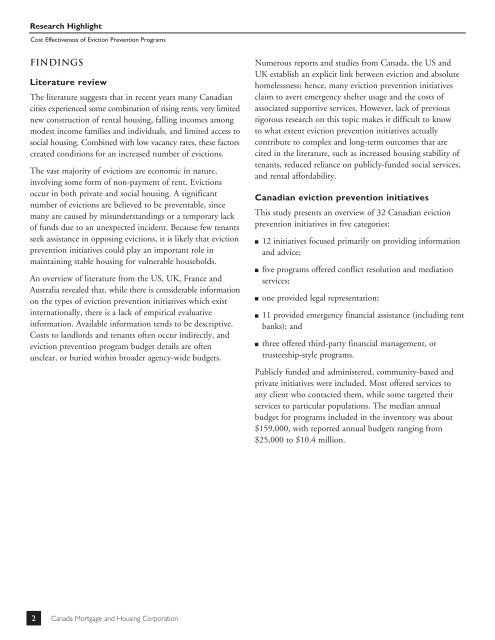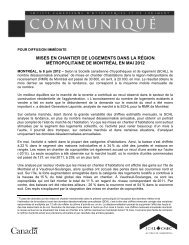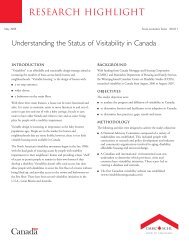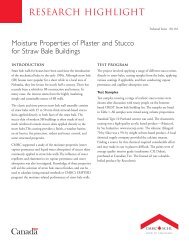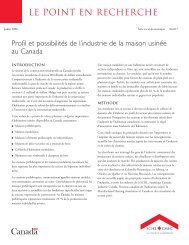Cost Effectiveness of Eviction Prevention Programs - SCHL
Cost Effectiveness of Eviction Prevention Programs - SCHL
Cost Effectiveness of Eviction Prevention Programs - SCHL
You also want an ePaper? Increase the reach of your titles
YUMPU automatically turns print PDFs into web optimized ePapers that Google loves.
Research Highlight<br />
<strong>Cost</strong> <strong>Effectiveness</strong> <strong>of</strong> <strong>Eviction</strong> <strong>Prevention</strong> <strong>Programs</strong><br />
Findings<br />
Literature review<br />
The literature suggests that in recent years many Canadian<br />
cities experienced some combination <strong>of</strong> rising rents, very limited<br />
new construction <strong>of</strong> rental housing, falling incomes among<br />
modest income families and individuals, and limited access to<br />
social housing. Combined with low vacancy rates, these factors<br />
created conditions for an increased number <strong>of</strong> evictions.<br />
The vast majority <strong>of</strong> evictions are economic in nature,<br />
involving some form <strong>of</strong> non-payment <strong>of</strong> rent. <strong>Eviction</strong>s<br />
occur in both private and social housing. A significant<br />
number <strong>of</strong> evictions are believed to be preventable, since<br />
many are caused by misunderstandings or a temporary lack<br />
<strong>of</strong> funds due to an unexpected incident. Because few tenants<br />
seek assistance in opposing evictions, it is likely that eviction<br />
prevention initiatives could play an important role in<br />
maintaining stable housing for vulnerable households.<br />
An overview <strong>of</strong> literature from the US, UK, France and<br />
Australia revealed that, while there is considerable information<br />
on the types <strong>of</strong> eviction prevention initiatives which exist<br />
internationally, there is a lack <strong>of</strong> empirical evaluative<br />
information. Available information tends to be descriptive.<br />
<strong>Cost</strong>s to landlords and tenants <strong>of</strong>ten occur indirectly, and<br />
eviction prevention program budget details are <strong>of</strong>ten<br />
unclear, or buried within broader agency-wide budgets.<br />
2<br />
Canada Mortgage and Housing Corporation<br />
Numerous reports and studies from Canada, the US and<br />
UK establish an explicit link between eviction and absolute<br />
homelessness; hence, many eviction prevention initiatives<br />
claim to avert emergency shelter usage and the costs <strong>of</strong><br />
associated supportive services. However, lack <strong>of</strong> previous<br />
rigorous research on this topic makes it difficult to know<br />
to what extent eviction prevention initiatives actually<br />
contribute to complex and long-term outcomes that are<br />
cited in the literature, such as increased housing stability <strong>of</strong><br />
tenants, reduced reliance on publicly-funded social services,<br />
and rental affordability.<br />
Canadian eviction prevention initiatives<br />
This study presents an overview <strong>of</strong> 32 Canadian eviction<br />
prevention initiatives in five categories:<br />
■ 12 initiatives focused primarily on providing information<br />
and advice;<br />
■ five programs <strong>of</strong>fered conflict resolution and mediation<br />
services;<br />
■ one provided legal representation;<br />
■ 11 provided emergency financial assistance (including rent<br />
banks); and<br />
■ three <strong>of</strong>fered third-party financial management, or<br />
trusteeship-style programs.<br />
Publicly funded and administered, community-based and<br />
private initiatives were included. Most <strong>of</strong>fered services to<br />
any client who contacted them, while some targeted their<br />
services to particular populations. The median annual<br />
budget for programs included in the inventory was about<br />
$159,000, with reported annual budgets ranging from<br />
$25,000 to $10.4 million.


